Our next episode opens with Rosa and Maria entering the mansion, presumably right after the recurring scene with the rose. (This scene, at least, seems like a definite part of the Rokkenjima Prime timeline).
That said, the narration is a little different this time, saying Rosa ordered Maria to stay in the garden forever after an argument. There’s no mention of Maria having encountered a stranger in the garden either—she has an umbrella but doesn’t claim that Beatrice gave it to her. But outside of these details, it’s still basically the same: Rosa was an ass to Maria, Maria was left out in the rain.
Right now, though, Rosa seems downright friendly and playful—even uu-ing along with Maria! They both talk about holding hands and being friends (仲良く).
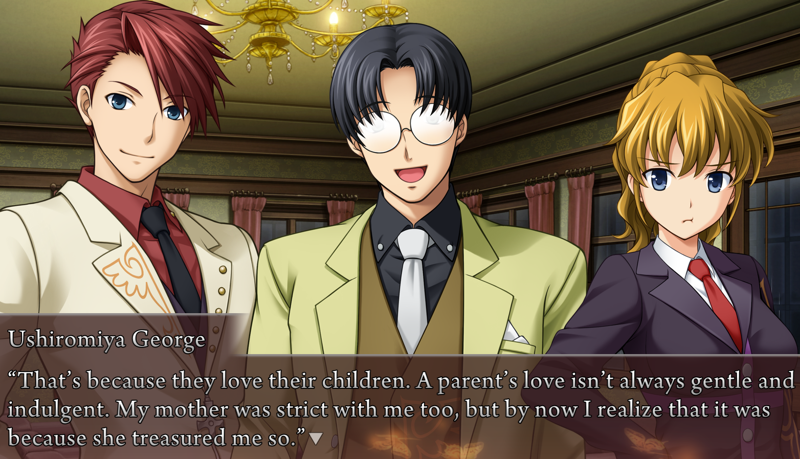
George can’t resist the chance to do a bit of apologism anyway. What’s with this guy, honestly? I do not get what Sayo sees in him.
This sappy scene pisses off Ange, who drops her teacup on the floor, hard. She dismisses Ronove’s offer to replace it, and excuses herself, even as Battler says that he expects Maria will declare she got an umbrella and letter from Beatrice any minute. From his POV, her form melts into air.
We get an interesting new background in which we see a kind of ‘window’ in a spiral of purple space…
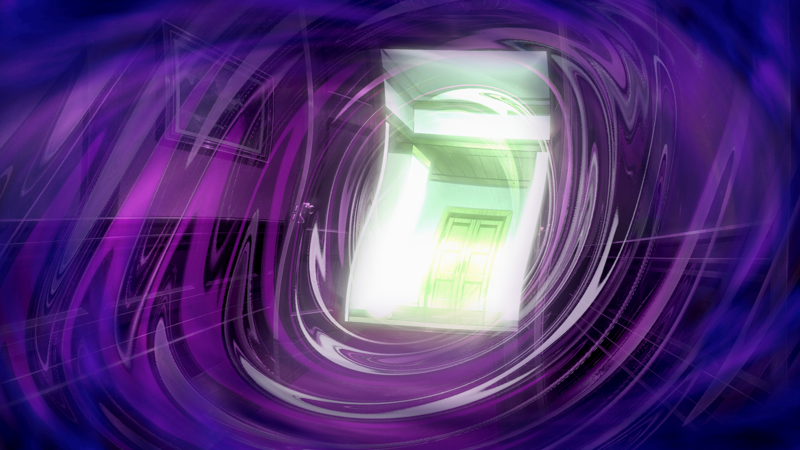
I wondered if this might be how Rokkenjima can be seen from the ‘tea room’, but it is perhaps more a space which Ange retreated into. Maria appears there—presumably the introject Maria which Ange was able to develop earlier from the diary. She’s now able to summon the diary out of thin air.
Maria cuts to the heart of it quickly, asking why Ange thinks she isn’t happy. The difference in perspectives, or ‘truths’, comes up again. From Ange’s ‘objective’ perspective, there’s no way Maria can be happy. Maria reminds us that truth depends on the observer, and observers from the future get priority… and we go back in time to that day that Rosa phoned Maria to say she was busy with work, and forgot that she’d promised to take her to the movies.
This is clearly a familiar situation, since Maria has a whole strategy for covering up that she’s on her own: going to different stores, and telling any suspicious cops that she’s running an errand for Rosa. Oof. So Rosa will come up with this whole elaborate cover story and school Maria on it rather than take a few less hours of overtime at the fashion house.
Sakutaro returns to the narrative. He’s been watching some kind of game show on TV. But Maria needs to vent about her situation. Sakutarou attempts to speak in Rosa’s defence, explaining the concept of jobs and money. Maria isn’t having it.
Maria: …………………………Don’t need food. Don’t need clothes. Don’t need school lunches and don’t want to go to summer camp. …It’s not like any of the groups will let me join in.
Sakutaro takes a different tack, talking about a time when Rosa was crying and leaned on Maria, her only ally in the whole world. He invents ways to present Rosa as an outcast like Maria and play on Maria’s sympathies. He pulls out all the rhetorical tricks.
Sakutaro: ………Uryu… Me being with you………can’t stop you feeling sad……?
It works and Maria has a good old cry. There’s a classic little anime speech about not crying.
Maria: Why won’t you cry, Sakutaro…? You still won’t cry, even when it’s this lonely and you can’t hold back the tears…?
Sakutarou: Uryu. But if I cry, who will make you feel better…? So I’m not going to cry. Because I want to make you smile.
Maria: If I smile, ……will Mama come back……?
Sakutarou: When she does come back and you greet her with a happy face, ……I’m sure she’ll feel the same. Uryu.
Rosa is of course completely oblivious to this drama playing out in the head of her daughter. And Sakutaro persuades Maria to bury her feelings and smile to her mother, rather than make her sad. Maaaan.
Until then, though, it’s time for a pajama party with Sakutaro. Hooray! Candy and soda! Mods are asleep! Kill the cop in your head!
We get another cultural note as Sakutaro uses this expression:
Let’s split open peanuts and try to guess which half is the grandpa.
Here’s your cultural note:
When peanuts that have been removed from their shells are cracked in half, one half has a nub on the end with small leaves protruding from it. In Japan, young children are sometimes told that the half with this nub is the grandpa, because the leaves look like a moustache.
The other half, obviously, would be the grandma.
(comment: idk something about gay peanuts with two grandpas. iunno. haha nuts.)
So, Maria and Sakutaro go ahead and have an ‘awesome, fun night’, enjoying various snacks and soda. Loneliness, conquered! Who even needs a parent. Maria checks frequently to see if Rosa might suddenly come home, but insists she’s only slightly disappointed that Rosa can’t join her party. So she writes a letter to pass on some of her happiness when Rosa gets back, which I will duly reproduce:
To Mama. Good job with your work again today☆ Some of my happiness for you to share. —From Maria
As thanks, she equips a new red scarf on Sakutaro. It has a little medal on it. Behold:
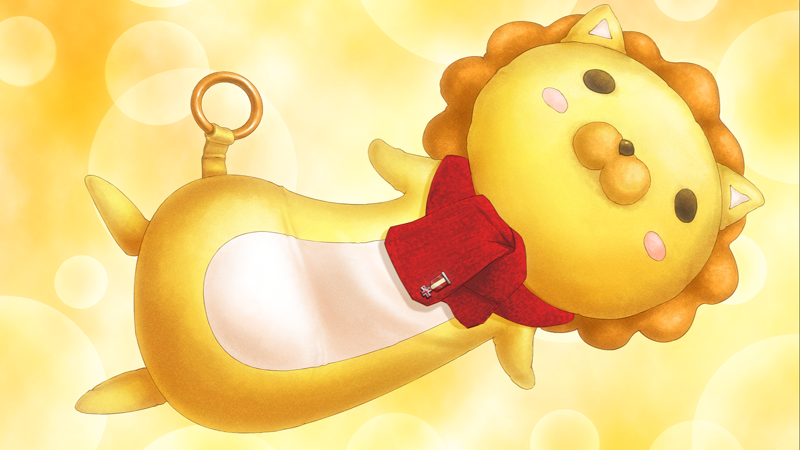
The colours of the medal seem to resemble the flag of Iceland, but there are so many goddamn medals in the world and no easy way to look them up, so if this is a real medal I don’t know how to find it!
The flashback finishes, and Maria says, look how happy I am Ange! Ange is not won over. Time for some listening practice!
Ange: これが、真里亜お姉ちゃんの幸せなの?
Maria: ん。真里亜は幸せ。
Ange: Is this your happiness, Maria?
Maria: Yes. I am happy.
Ange questions this claim, as is her habit. She brings up Rosa forgetting the movie, but Maria refuses to accept that Rosa could have been even slightly inconsiderate. Ange is increasingly upset by her unexpectedly magnanimous view, and just goes for it…
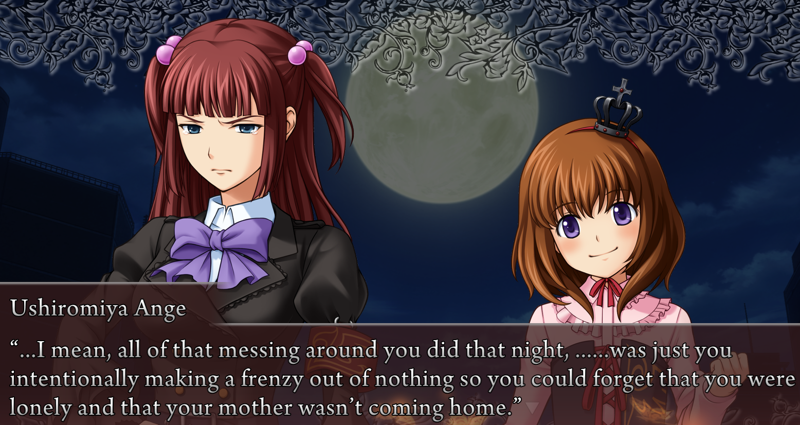
She goes as far as to deny to Maria’s face that she really had a fun party instead of a tantrum to stave off despair. This, Ange said, is obvious reading between the lines in the diary. And moreover, it’s obvious how Rosa always prioritised her work and public image over Maria, and how hollow her words of love are.
All of this is… well, my reading of the situation too, and probably that of most adult readers, so it’s interesting that Maria is so stubbornly upholding her narrative. Of course, Ange is also projecting her own feelings about her shit situation…
Ange: How aren’t you sad? How is it that you can experience a reality filled with misfortune and call yourself happy?! I can’t do it, I can’t understand it…!!
Maria: ……………You are a sad kid (悲しい子種), Ange.
Anyway, we get to the point of all this: another iteration on the ‘without love it cannot be seen’ theme…
Maria: ………Even though a ‘fact’ about a really fun pajama party is written in my diary, ………when it’s observed by a different person, it looks like that same ‘fact’ takes a different form, huh.
There’s actually a neat little slant rhyme in Japanese that isn’t preserved in English: when Maria says ‘happy’ she uses the word 楽しい, and when she says ‘sad’ she uses the word 悲しい.
Mm… as much as this translation is consistently excellent and I’m awed at the work involved, I would love to have the skills to read this in original language. One day!
Anyway, Maria begs Ange not to overwrite her happy ‘truth’ of that night with a new and different truth. Which can be glossed like… well, given that this ‘Maria’ is in a sense a construct, that this can all be read as a dramatisation of what’s playing out in Ange’s mind, it’s kind of Ange arguing herself out of accepting the conclusion she drew from that page of the diary…
Ange of course interprets it the other way round: that Maria ‘painted over the lonely truth with a happy truth’. A ‘power’ which she does not share. Maria—acting here as a tour guide or librarian to the diary—explains that she eventually learned the name of this ‘power’ (and, I assume that name isn’t ‘willful self-delusion’), but she’ll talk about it later in the diary. Fair enough, Maria.
We apparently aren’t yet done with this flashback. Rosa shows up with a very tired ただいま (I’m back). Rosa is not looking forward to returning to the lonely daughter she left in the house, and is rather taken aback by Maria’s chirpy mood.
We should probably put a word to point of view here. The narration does not take Maria’s first-person POV, and draws conclusions that are not at all in Maria’s voice, like…
However, when she was welcomed by an unbelievably happy Maria, ……and discovered unbelievably that her fears had been unfounded, Rosa couldn’t hide her surprise.
But this doesn’t seem like Ange’s voice either, since Ange has a rather gloomier view of the situation. Whose voice is this in this third person past tense narration? It is a voice that doesn’t simply narrate events, but draws connections: not simply ‘Rosa couldn’t hide her surprise’, but all of this explanation as to why.
I don’t really know the answer, but having been reading pochapal, and the emphasis she’s putting on POV switches in her interpretation, I’m definitely going to be keeping an eye on this.
Anyway, Rosa brought presents: cakes and a diorama of ceramic animal figures with musical instruments. Uh huh OK. Careful with those Maria? They sound kind of breakable. And then, sharp.
Maria helps Rosa get ready for bed but perhaps we’re wondering why this scene, because it seems we dropped the payload already… and the answer is, it’s time for more Rosa Abuse Moments! Hooray…….!
So the deal this time is, Maria helps pick up Rosa’s coat, and when she does, some kind of ticket stub falls to the floor, one for somewhere called Atami (a small city famous for its hot springs). Before Maria can draw any conclusions from this, well, this happens…
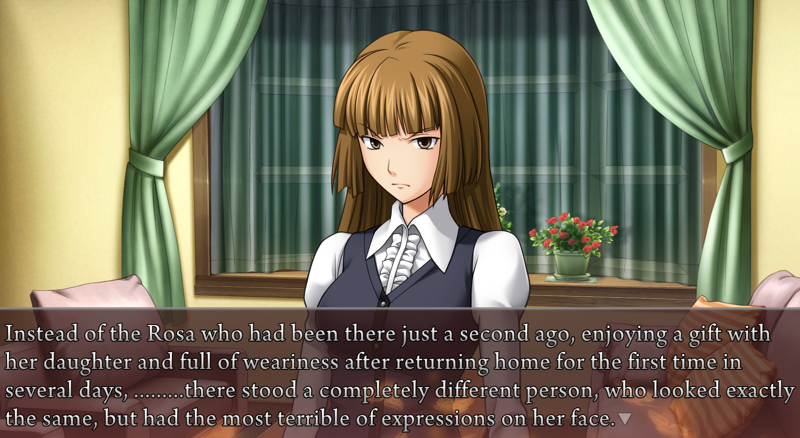
So, before we see what she does, let’s consider… what about this pisses Rosa off so badly? Well, what conclusions can be drawn from a ticket to Atami? Seems all but explicitly stated that, instead of being held up by ‘working hard’ as she claimed, Rosa decided she’d rather take some time at the onsen before coming home. Or perhaps she was even having an affair or something like that? (Not that she’d really need to hide it. Idk. I watched Lola Rennt earlier today. I figure rich people are just having affairs at all hours.)
Maria of course blames herself for not managing Rosa’s mood perfectly. She snaps into fawn-response apology mode for touching this oh so important ticket, and anxiously tries to predict what Rosa will do, but Rosa simply storms out without a word.
This poor kid! Fuck, man.
Ange, too, interrupts as Maria attempts to calm herself with Sakutaro.
Ange: ………………Please stop. …I can’t bear to watch this.
Maria is once again back on her mother’s defense, sounding just like George in spouting some Pure Motherfucking Ideology. Adulthood as learning to accept abuse.
Maria: What is [painful]…? That Mama suddenly got mad? ………That happens sometimes when people get tired. ……Condemning a person because of a momentary misplaced emotion isn’t very adult of you, Ange.
Ange spells out the obvious conclusion about Rosa’s ticket stub to Maria. Maria is like, oh, but have you seen all these thought terminating cliches? She finds endless reasons to let Rosa off the hook.
Then she says something a little funny, and witchy…
Maria: ………You really are a poor child, Ange. ………There are fragments that could make you happy, so many of them, scattered all about your feet, and you can’t find them.
……Instead, all you find are the unhappy fragments, and you keep getting hurt over and over. ……That’s why you get scared of being hurt, ……and you can’t start even looking for happiness until after you’ve finished making sure that there’s nothing around you that could hurt you.
Because Ange wants the real truth, not a comforting fantasy, right? But still, we’re left wondering, what exactly is a fragment? It seems that a fragment might be essentially a person’s worldview, or a temporary conclusion in interpreting a situation, given form as a self-governing world. In other words, a ‘fragment’ is a narrative.
Maria mentions the fable of Tyltyl and Mytyl searching for the blue bird of happiness—a Belgian play that was adapted to a 26-episode anime in 1980 in which the two children are searching for the Blue Bird of Happiness.
Here’s how TVTropes summarises the story:
The original play tells the tale of Mytyl and Tyltyl, two poor children. One night an old crone (who resembles their neighbor Berylune) arrives at their cottage and tells the children they must seek the Bluebird of Happiness for her sickly daughter. She gives the boy a cap with a magic diamond that reveals the true spirits (anthropomorphic personifications) of all things — including their cat Tylette and their dog Tylo, and those of Sugar, Bread, Milk, Water, Fire, and Light. This band serves as their companions as they venture through many lands and encounter everyone from the spirits of their grandparents to the decadent Luxuries to the simpler but more enduring Happinesses to Father Time himself. The Blue Bird proves elusive at every turn, but upon arriving home it turns out to be their own pet bird, which they give to Berylune’s daughter. It flies away, and Tyltyl asks the audience to help them find it again…
So kind of a conservative fable: if you’re on the bottom of social inequality, you should just learn to make the best of your shitty lot, and not seek any sort of redress or change in the situation. It’s one side of that old saw, the Serenity Prayer, but drops the part about courage to change the things you can entirely.
Maria says that, like the kids, Ange won’t ever find her blue bird of a perfect fragment. Of course, it hardly needs to be said that there’s a lot of room between an impossible perfection and not getting child abused by your mum.
We cut back to the flashback, this time following Rosa’s POV—something Maria’s diary definitely could not have access to! She finds the letter that Maria wrote earlier. Whatever is written inside that envelope brings Rosa to tears, and she runs out and hugs Maria and apologises to her.
See, says Maria. All’s well that ends well.
The conversation turns back to Maria’s ‘power’ that lets her be upbeat even in the worst situation. Maria says, yeah, that’s why you’re reading this diary right? She says she taught Ange when she was young… and now ‘she’ will teach Ange again.
I shall teach you in Maria’s place.
appears in the middle of the screen, voiced by Beatrice in a rather serious voice.
The ‘power’ that they’re speaking of is… magic. Of course. I guess Beatrice just waltzed into this private conversation. In any case, she sets the environment to the garden of Kuwadorian, placing herself, Maria, Sakutarou in there. Maria introduces Sakutarou to her ‘friend’, Beatrice.
Beatrice reacts as if what Maria has accomplished is no small feat of magic.
Beatrice: Is breathing a soul of magic into inorganic matter and giving it life in this way… a commonplace practice for you?
Maria: ……Uu. Sakutaro isn’t inorganic matter, he’s a lion cub.
Beatrice declares that a stuffed animal is an excellent vessel for spirits, who respond to innocent children and start to move on their own sometimes—at least until the ‘toxin’ of doubt shuts it down. But there’s a lot more to Sakutarou, who has ‘completely manifested’ in the human world.
Beatrice: He has his own character, talks with his summoner freely, and even moves by his own will.
This seems significant with regard to the matter of furniture, huh. Moreover, Maria summoned him out of the ‘sea of zero’ rather than another world. This is powerful magic, even despite Maria humbly saying she’s merely an apprentice who can’t do real magic yet, even despite Maria being unaware of exactly what she accomplished.
Beatrice seems to be fitting Maria’s form of magic into her own framework here. Compared to the limitations and strengths of magic narrativised by Beatrice so far—notably the significance of furniture—it makes sense that she’d make a big deal of Maria doing this. The thing is of course, is this insight into ‘how magic really works’, or just Beatrice building up her own narrative sandcastle some more? In any case, this is the limitation Beatrice declares:
It isn’t hard to create soulless beings in any number. However, creating a being with a soul is very difficult. …Beato declared this definitively.
So exactly how much of Beatrice’s furniture has souls (魂), I wonder? Ronove seems a surefire bet. The Seven Sisters are kind of thin on character, but they do have the sort of independence and will that Beatrice attributes to Sakutarou, so maybe them too. The goats, probably not..? That said, Beatrice was surprised at the power displayed by Kanon and Sayo, Kinzo’s unique furniture with human hearts, so perhaps the answer is actually ‘none of them’.
Beatrice, apparently on a spate of throwing out hints, also mentions that this power of Maria’s si something Kinzo ‘desired above all else’. Well, we kind of new that already, with his furniture experiments and efforts to bind Beatrice in a body, but we’re being reminded.
She goes on! Explaining that Maria’s power to create things ab nihilo, and change her worldview by so doing (e.g. how Sakutarou cheered her up), is a sign that she’ll probably grow into a Great Witch in her own right. Perhaps called something like the Witch of Origins.
So, Beatrice decides to give Sakutarou a magical present—her magic power, to ‘achieve an even stronger manifestation’. This requires a ‘stronger image’—presumably, a talksprite!—and that means it’s a perfect time for Virgilia to show up. Notably, in this scene she’s still going by the name Virgilia, even though that was a name she adopted during the previous game after losing the rights to the name Beatrice. That seems like it may be significant.
Is this whole chapter just a little play Beatrice is putting on to confuse Ange and Battler once again, like the whole tsundere affair?
Virgilia introduces herself to Sakutarou, and when he answers, manifests a candy for him to eat. Beatrice explains that she’s going to use ‘a magic’ of Viriglia’s to help manifest Sakutarou. The ritual involves writing in Maria’s grimoire, essentially a legal document signed and witnessed and a drawing of Sakutarou’s new form.
Virgilia jokes that Beatrice could be a secretary in the netherworld with her magical document skills. I dare say furry adoptables would be another line of work.
Here’s how the text of the document is described:
It was a powerful document that proclaimed to the beings of a higher world that Sakutarou had most certainly manifested in the human world.
Sakutarou, created by Maria, had received the recommendation of the two witches Beatrice and Virgilia, and in this very moment, the higher world had accepted his existence.
So much of Beatrice’s magic seems to revolve around writing and legalism! From the simple magic circles to the letters declaring various facts about the situation to, indeed, whatever the mysterious contract was that she tried to get Battler to sign… To make something become true, it seems you must simply declare it with enough formal ceremony. Not unlike the law itself.
Virgilia’s signature is something of a force multiplier on the contract, due to her friends in the ‘higher world’. Beatrice also namedrops something called the ‘treaty of Mariage Sorcière’… apparently French for ‘witch wedding’. They show Sakutarou the picture, a light swallows him up, and…
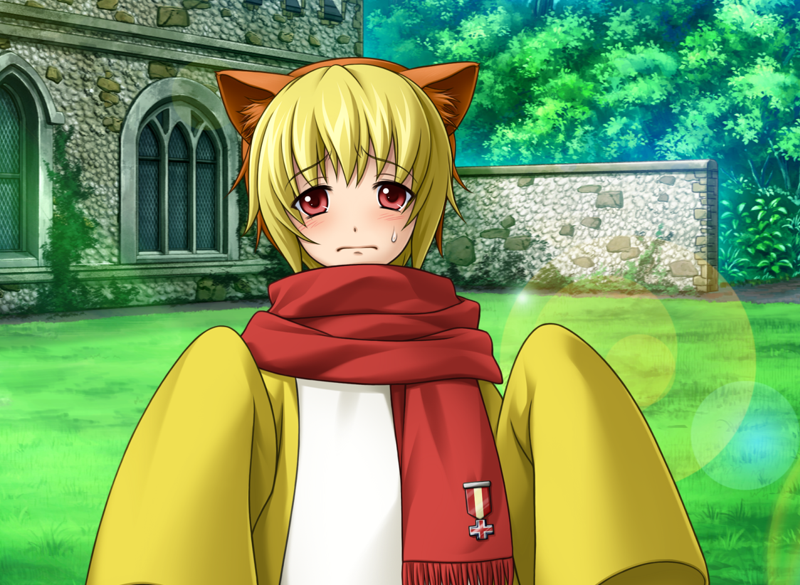
…the expected talksprite drops. Long bangs, and an oversized tunic that resembles his original stuffed toy incarnation. Expression of embarassment and consternation that seems to be permanent.
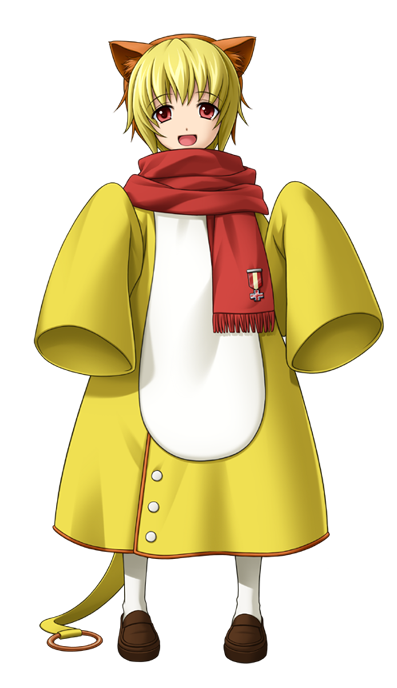
This means he gets a character page at last. On the ‘Witch side’ tab, naturally. Here’s what we learn:
- さくたろう
-
Beloved furniture of Lady Maria, witch of Mariage Sorcière.
His existence is Lady Maria’s pure white heart itself.
He is an irreplaceable being to her, and could even be said to be another Lady Maria.He holds a decoration as a diplomat, and all witches, weapons, and furniture in the alliance, and even demons and divine spirits in contract with the alliance, are not permitted to take aim at him.
So Mariage Sorcière is some kind of witch alliance, huh. If he’s a diplomat, who exactly does he represent?
Beatrice gives us some character design notes:
Beatrice: I felt that the scarf was his charm point, you see. And the ears! Animal ears are nice indeed, truly cute! Allow me to nibble at them later. *cackle*!
She further promises to initiate Maria, the Apprentice Witch of Origins into more magic, since she’s on the cusp of graduating into a full witch. (Great. That’s just what we need, more superpowered children.) Elaboration: Witch of Origins title that Maria pursues is that of a ‘Creator’, but for now Maria only qualifies as an ‘Enchanter’.
Beatrice: ……But after one thousand years of training, it is not unthinkable that you could create not just your own system of magic, but even a galaxy.
One thousand years! And I thought animation was a tough subject to learn.
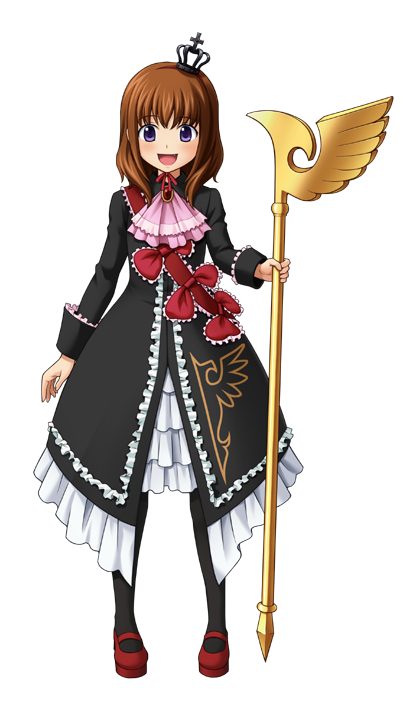
Apparently still in a character design mood, Beatrice gives Maria a new outfit suitable for a witch… which involves this kind of sash with bows on it. Incidentally, I learned while writing the alt text that her neck decoration appears to be best described by the term jabot. What an educational game this is!
However snazzy the new outfit, Beatrice warns Maria to be discrete with it, and save it for big events. That will save the sprite artists some work…
We pull back out of this flashback to whatever dimension Ange is chilling in. Now… if these events truly happened, the question is when! The ‘Beatrice’ that existed in Kuwadorian died before Maria was even born. But, magic.
Maria says this, almost directly addressing what I said about accepting circumstances rather than changing them…
Maria: Please, don’t be afraid of being happy. Becoming happy isn’t the same thing as accepting your current misfortune. It means creating a new happiness within your current misfortune. That is the Magic of Origins.
She promises to teach Ange how to get over her reluctance. She says Ange was actually also entered into the mysterious Mariage Sorcière as a witch apprentice. Guess we’re just rolling with that existing now. Sometimes you get a cool idea I guess!
And indeed, the next chapter is titled Mariage Sorcière. So I guess we’ll find out what the deal is next time!
So! That’s a wrap on Chapter 5!
Not a lot has really happened, but there’s been plenty of heavy thematic lifting. As ever, magic operates on both an emotional plane and a physical one. Emotionally, the theme here is about dealing with difficult circumstances that are beyond your power to change. Maria and Ange are both children, powerless within society, with their wellbeing entrusted to people who are either indifferent and prone to lashing out (Rosa) or outright sadistic (Eva).
There is definitely some truth to the view that, faced with uncontrollable, painful circumstances, you can react in a number of ways—it is possible to be resilient, or to despair. It is also true that it’s considerably easier to be resilient when you are economically secure, healthy, and surrounded by friends, and you can’t simply overwrite emotions by force of will. And, of course, finding ways to be happy in a bad situation does not mean you have to make all the excuses that Maria makes for Rosa. ‘This sucks, but I have to make the best of it’ is a very different attitude to ‘this is fine actually!!’.
But it’s far from unsurprising that Maria is apologising for the person who harmed her so frequently—it’s all too natural that she’d react that way. Umineko’s depictions of familial abuse continue to be pinpoint accurate.
At this point the story seems to increasingly be driving at the idea that all this talk of ‘magic’ should not merely be interpreted as a pure worldbuilding exercise (although having fun with that is definitely a part of it), but as an oblique way of talking about emotional matters. Whoever is diegetically telling us this story—be it Beatrice or someone else—has a point to make.
Perhaps, then, with all this talk about the slipperiness of truth and the use of magic to shape how we feel about the world, they’re still laying the groundwork for when they get around to presenting what ‘really’ happened on Rokkenjima, shaped by the particular way they feel about it. That still doesn’t tell us very much about what did happen, but it seems like a way to interpret the arc of where this is all driving.
(This line of thought is shaped by some of the stuff pochapal picked up on too, like the ‘detective’ and ‘romantic’ readings brought up by Kyrie in episode 1. The answer that is being built will presumably be a synthesis of both, and right now Umineko is trying to explain how to build that synthesis?)
Anyway, all that said, it’s been way too long without a murder. C’mon Beatrice, chop chop! These Ushiromiyas won’t kill themselves!
…will they?
Comments
mads_in_zero (e937d75cce0eb3ecfd41e24328187bc6)
Just caught up with this live-read today! Absolutely loving the theory crafting. Finally, Episode 4 introduces the best character, Sakutaro, the powerful diplomatic vegata-lion, who I guess essentially has had Beatrice’s legal theme stapled onto Maria’s idea of him.
I do love stories that equate creating something through magical means to essentially creating a character.
mads_in_zero (e937d75cce0eb3ecfd41e24328187bc6)
Oh right! There was something I wanted to say, now that I’ve caught up - I really love that this visual novel signals magic by using electronic music.
Episode 1, which is a major paschtiche of certain styles of detective fiction, (closed circle rich mansion, characters dropping one by one), maintains a consistant classical music flair throughout, they have so many violin pieces.
Until, suddenly, Maria reads out Beatrice’s letter, and the first really off-kilter song (Fishy Aroma) plays. It’s the first song a lot of players, myself included, really notice as standing out.
And then, when the murders start, we get the music playing over the body discovery, GoldenSlaughterer. It mixes Beatrice’s classical music leitmotif with Electronic Dance Music to create a song that signals the classical mystery tropes have been interrupted by a Witch.
(There’s another series of doujin VNs that use electronic music for a similar effect (signalling “magic”), the TYPE MOON series, particularly it’s second entry, Fate/Stay Night. Ryukishi is unabashedly a fan of those games.)